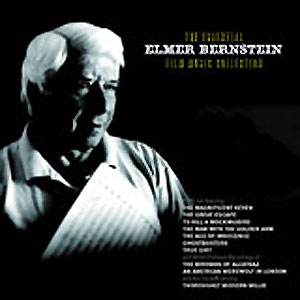The Essential Elmer Bernstein: Film Music Collection
The Magnificent Seven
To Kill A Mockingbird (Suite)
The Buccaneer (Overture)
Walk on the Wild Side
An American Werrewolf in London (Metamorphosis)
The Age of Innocence (End Titles)
The Comancheros
Ghostbusters
Heavy Metal (Taarna’s Theme)
Johnny Staccato
True Grit (Rooster Cogburn/A Warm Wrap-Up)
Hollywood and the Stars
Zulu Dawn (River Crossing)
The Great Escape
The Man with the Golden Arm
Far From Heaven
The Sons of Katie Elder
Airplane (Suite)
The Shootist (Main Title)
Hawaii (Overture)
The Birdman of Alcatraz (Finale)
The Hallelujah Trail (Overture)
The Bridge at Remagen
Thoroughly Modern Millie (Sky-Hi)
The Scalphunters
The Ten Commandments (Overture)
Music composed by Elmer Bernstein
Performed by The City of Prague Philharmonic Orchestra, National Youth Jazz Orchestra, and Crouch End Festival ChorusConducted by Nic Raine, Paul Bateman, Bill Ashton, and James Fitzpatrick
Available on Silva Screen SILCD1178 (2 CDs)
Running Time: 110:22 (Total)
(Disc 1) 57:15
(Disc 2) 53:07

Film Music lost one of its most popular and admired composers last year with the death of Elmer Bernstein whose career spanned half a century and over 250 films. This 2CD compilation (as usual with Silva Screen CDs it is as well to check for significant duplication over their other releases) includes world premiere recordings of music from: The Birdman of Alcatraz, Thoroughly Modern Millie, and An American Werewolf in London.
An American Werewolf in London (1981) is one of Bernstein’s blackest scores, unrelentingly creepy, and menacing. It crushes as surely as the werewolf’s jaws. From The Bird Man of Alcatraz the compilation includes the Finale; the music’s trilling and chirruping suggesting the birdcalls that comforted the incarcerated murderer John Stroud who became one of the world’s foremost ornithologists. From Bernstein’s Oscar-winning Thoroughly Modern Millie music we hear the endearing music for the rich and intrepid Carol Channing who takes a flying lesson – Bernstein accompanying her aloft with the bright and breezy ‘Sky-Hi’.
One of the highlights of the set is the ‘Suite 8½-minute’ from one of his best-loved scores, To Kill a Mockingbird (1962), so redolent of the joys and fears of childhood. There is music tender and warm too for the ‘woman’s film’ with a difference, Far From Heaven (2002) lamenting, echoing the feelings of the heroine who discovers that her husband is having an affair with a man. The lovely broad theme music for the documentary Hollywood and the Stars (1963) is brilliantly apposite in nostalgically recalling all the glamour of Hollywood in its Golden Age. The End Title of The Age of Innocence (1993) summarises the social mores of 19th century upper-class New York, elegance and refinement with the delicacy of lace embroidery but also its forbidding exclusivity.
The ethereal Taarna’s Theme from Heavy Metal (1981) with its harp and flute arpeggios, celesta and twinkling little bells and ondes martenot is quite enchanting and one of Bernstein’s most magical inspirations, and it is given the full romantic treatment here under Nic Raine.
Elsewhere the National Youth Jazz Orchestra’s delivery of Walk on the Wild Side (1962) is wilder but curiously has less sardonic bite to my ears than the original film’s soundtrack but that does not deter from the pleasure it gives. Johnny Staccato (1959), given an uncompromisingly blowsy, gritty reading, is a score which recalls the seamier side of urban life. The Man With The Golden Arm (1955) had another big band jazz score – the music defiant and assertive.
The early score The Buccaneer (1958) has the grand sweep, swagger and romance we associate with the swashbucklers of that period (reminiscent of Korngold and Steiner et al.- great fun). Bernstein created an exuberant glittering score for Hawaii (1966) full of joie de vivre with much ethnic percussion, but there is also a concluding element of menace.
Bernstein’s commanding score for The Ten Commandments (1956) is another of the composer’s best-remembered scores. In it he eschews much of the saccharine piety of so many biblical epic scores of the 1950s.
Elmer Bernstein’s Airplane score is a brilliant comic take-off of the overblown scores for Hollywood disaster movies starting with a cheeky homage to John Williams’s Jaws music. This short suite will surely raise a few smiles. Ghostbusters, not one of Bernstein’s most inspired compositions, underlines the on-screen absurdities.
The western themes have all the exuberant vitality we came to associate with Bernstein, the strong snappy rhythms, pronounced percussive ostinatos and colourful, often Latin-based orchestrations: The Magnificent Seven, of course, The Comancheros, The Sons of Katie Elder, the joyful swaggering The Hallelujah Trail and True Grit (music here also has a moment of tenderness and vulnerability) – all exciting and memorable. Slightly different especially in the use of percussion is Bernstein’s more astringent Main Title music for The Shootist (1976). Then there is the homely, folksy, humorous atmosphere of the Overture for The Scalphunters.
The Zulu Dawn (1979) music nicely epitomises British military pride contrasted with the wilder pride of the Zulu hordes. Another war film score, The Great Escape, needs no introduction. James Fitzpatrick gives us a nicely heroically defiant reading. The Bridge at Remigan (1969) another war film score is strongly rhythmic and not far distant in spirit to Bernstein’s western scores.
A well-chosen representative selection of Elmer Bernstein’s scores exuberantly performed in splendid sound. Recommended.
Ian Lace
Return to Index